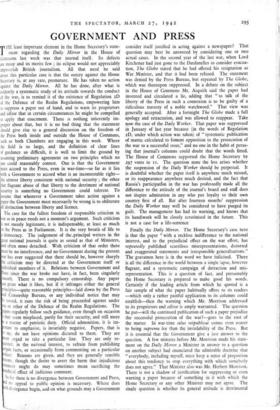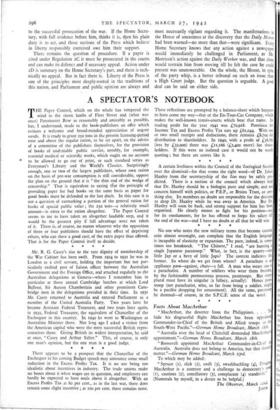GOVERNMENT AND PRESS HE least important element in the Home
Secretary's state- j ment regarding the Daily. Mirror in the House of Commons last week was that journal itself. Its defects are many and its merits few ; its eclipse would not appreciably impoverish British journalism. All that need be said about this particular case is that the outcry against the Home Secretary is, at any rate, premature. He has taken no action against the Daily Mirror. All he has done, after what is evidently a systematic study of its attitude towards the conduct of the war, is to remind it of the existence of Regulation 2D of the Defence of the Realm Regulations, empowering him to suppress a paper out of hand, and to warn its proprietors and editor that in certain circumstances he might be compelled to apply that enactment. There is nothing inherently im- proper about that, but it is no bad thing that the statement should give rise to a general discussion on the freedom of the Press both inside and outside the House of Commons, such as both Chambers are engaging in this week. Where the field is so large, and the definition of clear lines of guidance so difficult, it is well to limit the ground by assuming preliminary agreement on two principles which no one could reasonably contest. One is that the Government must accord to the Press, even in war-time—so far as it lies with a Government to accord what is. an incontestable right— the utmost liberty consistent with national security ; the other that flagrant abuse of that liberty to the detriment of national security is something no Government could tolerate. To assume that whenever a Government takes action against a paper the Government must necessarily be wrong is to obliterate all distinction between liberty and licence.
The case for the fullest freedom of responsible criticism in war as in peace needs not a moment's argument. Such criticism s not merely legitimate, it is indispensable, at least as much in the Press as in Parliament. It is the very breath of life to a democracy. The judgement of the .principal writers in the great national journals is quite as sound as that of Ministers, d often more detached. With criticism of that order there must be no interference, and no Government during the present ar has ever suggested that there should be, however sharply the criticism may be directed at the Government itself or dividual members of it. Relations between Government and ress since the war broke out have, in fact, been singularly smooth. There is no compulsory censorship. Any paper print what it likes, but if it infringes either the general rinciples—quite reasonable principles—laid down by the Press d Censorship Bureau, or any individual notice that may issued, it runs the risk of being proceeded against under e or other of the Defence of the Realm Regulations. The pers regularly follow such guidance, even though on occasion may seem misplaced, partly for their security, and still more a matter of patriotic duty. Official admonition, it is im- tant to emphasise, is invariably negative. Papers, that is say, do not have opinions dictated to them. They are 'Cr urged to take a particular line. They are only re- uested, in the national interest, to refrain from publishing in facts, or occasionally from commenting on a particular blect. Reasons are given, and they are generally sensible sons, though the desire to avert the harm that injudicious mment might do may sometimes mean sacrificing the eficial effect of judicious comment.
So far there is no divergence between Government and Press, 00 appeal to public opinion is necessary. Where does h divergence begin, and on what grounds may a Government consider itself justified in acting against a newspaper? That question may best be answered by considering one or two actual cases. In the second year of the last war, when Lord Kitchener had just gone to the Dardanelles to consider evacua- tion, The Globe stated that he had offered his resignation as War Minister, and that it had been refused. The statement was denied by the Press Bureau, but repeated by The Globe, which was thereupon suppressed. In a debate on the subject in the House of Commons Mr. Asquith said the paper had invented and circulated a lie, adding that " to talk of the liberty of the Press in such a connexion is to be guilty of a ridiculous travesty of a noble watchword." That view was generally accepted. After a fortnight The Globe made a full apology and retractation, and was allowed to reappear. Take now the case of the Daily Worker. That paper was suppressed in January of last year because (in the words of Regulation 2D, under which action was taken) of 'systematic publication of matter calculated to foment opposition to the prosecution of the war to a successful issue," and no one in the habit of perus- ing that journal's columns could doubt that the words fitted. The House of Commons supported the Home Secretary by 297 votes to x a. The question none the less arises whether the suspension of the Daily Worker shoul4 be perpetual. It is doubtful whether the paper itself is anywhere much missed, or its reappearance anywhere much desired, and the fact that Russia's participation in the war has professedly made all the difference to the attitude of the journal's board and staff does not inspire admiration in any who put loyalty to their own country first of all. But after fourteen months' suppression the Daily Worker may well be considered to have purged its guilt. The management has had its warning, and knows that its handiwork will be closely scrutinised in the future. This is not a case for a life-sentence.
Finally the Daily Mirror. The Home Secretary's case here is that the paper " with a 'reckless indifference to the national interest, and to the prejudicial effect on the war effort, has repeatedly published scurrilous misrepresentations, distorted and exaggerated statements and irresponsible generalisations." The gravamen here is in the word we have italicised. There is all the difference in the world between a single lapse, however flagrant, and a systematic campaign of detraction and mis- representation. This is a question of fact, and presumably the Home Secretary is prepared to make good his words. Certainly if the leading article from which he quoted is a fair sample of what the paper habitually offers to its readers —which only a rather painful application to its columns could establish—then the warning which Mr. Morrison addressed to its proprietors and editor is amply warranted. The question he put—will the continued publication of such a paper prejudice the successful prosecution of the war?—goes to the root of the matter. In war-time salus reipublicae comes even nearer to being suprema lex than the inviolability of the Press. But it is essential that the Government give a just answer to the question. A few minutes before Mr. Morrison made his state- ment on the Daily Mirror. a Minister in answer to a question on another subject had enunciated the admirable doctrine that " everybody, including myself, must keep a sense of proportion about this tendency to stop everything with which somebody does not agree." That Minister also was Mr. Herbert Morrison. There is not a 'shadow of justification for suppressing or even warning a paper because of something in it with which the Home Secretary or any other Minister may not agree. The single question is whether its general attitude is detrimental to the successful prosecution of the war. If the Home Secre- tary, with full evidence before him, thinks it is, then his plain duty is to act, and those sections of the Press which believe in liberty responsibly exercised owe him their support.
There remains the question of procedure. If a paper is cited under Regulation 2C it must be prosecuted in the courts and can make its defence and if necessary appeal. Action under 2D is summary on the Home Secretary's part, and there is tech- nically no appeal. But in fact there is. Liberty of the Press is one of the principles most deeply-rooted in the traditions of this nation, and Parliament and public opinion are always and most necessarily vigilant regarding it. The manifestations u; the House of uneasiness at the discovery that the Daily Mirror had been warned—no more than, that—were significant. Evers Home Secretary knows that any action against a newspaper Would immediately be challenged in Parliament, as Mr. Morrison's action against the Daily Worker was, and that alone would restrain him from moving till he felt the case he could present was unanswerable. On the whole, the House, in spite of the party whip, is a better tribunal on such an issue than a High Court judge. But the question is arguable. A good deal can be said on either side.



























 Previous page
Previous page